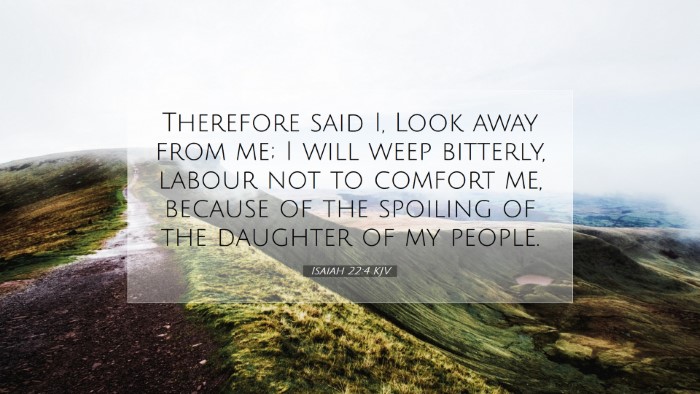Commentary on Isaiah 22:4
Isaiah 22:4 states: "Therefore said I, Look away from me; I will weep bitterly; labor not to comfort me, because of the spoiling of the daughter of my people." This verse speaks to the profound emotions of the prophet Isaiah during a time of distress for the people of Judah. The commentaries from various public domain authors bring rich insights into the implications of this verse.
Overview of the Context
Isaiah prophesied during a turbulent era when the nation faced impending doom due to foreign invasions, particularly from the Assyrians. Here, Isaiah expresses overwhelming grief for the fate of Jerusalem and its inhabitants, known as "the daughter of my people". Context is crucial for understanding the emotional weight carried in this passage.
Insights from Matthew Henry
According to Matthew Henry, the prophet uses strong language when he says, "Look away from me; I will weep bitterly." Henry notes that this reflects Isaiah's deep sense of personal loss and sorrow over the judgment pronounced upon Jerusalem. The idea of asking others not to comfort him indicates the gravity of his heartbreak, recognizing that the situation is beyond consolation.
Henry elaborates that such emotional expressions are not mere personal feelings but are indicative of a deeper spiritual reality. The devastation faced by Israel symbolizes the consequences of their disobedience to God, resulting in divine judgment. In this light, Isaiah's sorrow serves as a reminder to acknowledge the gravity of sin and the anguish it brings both to God and His prophets.
Insights from Albert Barnes
Albert Barnes offers a perspective emphasizing the prophetic office of Isaiah. According to Barnes, a prophet often bears the weight of his people's iniquities, and their suffering becomes his own. The call to "look away from me" conveys a sense of isolation; in his grief, Isaiah feels unable to engage with others or permit their attempts to offer comfort.
Barnes also highlights the phrase "the spoiling of the daughter of my people." He elucidates that this reflects impending destruction caused by the invasion of the Assyrians. The term "spoiling" conveys the devastation of both property and spirit, emphasizing a dual aspect of loss—physical and emotional. The mourning here is not just for the loss of material wealth but for the loss of the covenant relationship with God, which is far greater.
Insights from Adam Clarke
Adam Clarke further examines the notion of grief in this verse. He remarks that Isaiah's plea not to be comforted signifies the intense sorrow that requires space for lament. Clarke suggests that while comfort is usually a desirable thing, in this scenario, the depth of lamentation indicates that mourning is appropriate and necessary.
Clarke also underlines that this verse indicates a turning point where God’s judgment appears inevitable. The description of grief here is very human. As Clarke points out, it draws attention to the natural process of mourning in the face of tragedy. Isaiah's weeping is not solely a lament for the people but also an expression of his love and dedication as a prophet to the well-being of his nation.
Theological Implications
The profound emotional response of Isaiah in this passage opens up discussions on the nature of prophetic ministry. The combination of heartbreak, prophetic vocation, and the weight of communal sin prompts reflection on the role of pastors and spiritual leaders today. They are often called to bear the burdens of those they serve, creating a parallel with Isaiah's experience.
- Empathy in Ministry: Leaders are encouraged to embody compassion and sorrow, understanding the collective pain of their communities.
- The Weight of Prophetic Responsibility: Those in ministry must grapple with the realities of spiritual decay and be prepared to confront societal issues.
- The Call to Lament: Emphasizes the value of mourning within faith communities, acknowledging that grief is a legitimate response to sin and loss.
Application for Contemporary Readers
This verse and the accompanying insights serve as a rich tapestry for pastors, theologians, and students. It invites readers to engage with the emotional breadth of faith, particularly in times of despair. Some practical applications might include:
- Encouraging open dialogues about grief and loss in church settings, creating safe spaces for lament.
- Training leaders to recognize and express their feelings of sorrow in light of societal issues while maintaining hope and faith in God’s redemption.
- Utilizing Isaiah’s emotional example as a foundation for teaching about the importance of intercessory prayer and communal responsibility for spiritual well-being.
Conclusion
Isaiah 22:4 encapsulates a moment of profound sorrow that is deeply relevant in both the ancient and modern contexts. By combining insights from Matthew Henry, Albert Barnes, and Adam Clarke, we appreciate the layers of meaning within this verse that speaks to the heart of prophetic ministry, the reality of sin's consequences, and the significance of empathy in leadership. As onlookers of this scripture, the invitation is to reflect on the multi-faceted nature of grief, the assurance of God’s presence even in misery, and the enduring hope of restoration.


